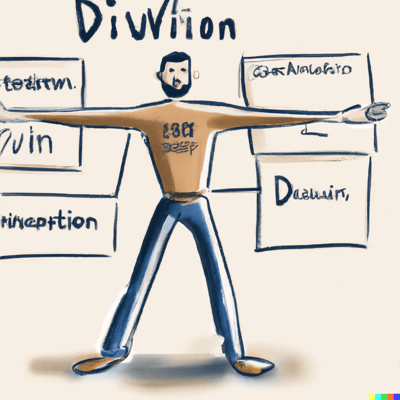Tl;dr - B2B buyers' expectations are increasingly shaped by B2C experiences. That means that mid-size industrial manufacturers must step beyond their comfort zones to deliver experiences that satisfy buyers and support competitive differentiation and sales goals. Website personalization is an important tactic to support that, and one that is entirely feasible for traditional manufacturing firms.
What is Website Personalization?
 Website personalization is a tactic that helps to improve your website visitors' experience by dynamically tailoring the content they see according to rules built on insights into firmographics, demographics, and intent data.
Website personalization is a tactic that helps to improve your website visitors' experience by dynamically tailoring the content they see according to rules built on insights into firmographics, demographics, and intent data.
In other words, the technology automatically changes the site content and experience based on what you know about the company (firmographics including industry, size, ownership, number of locations, revenue, etc.), the person (demographics and psychographics including job title, seniority, job function, geography, role on a buying team, etc.), and intent data (number of website visits, email clicks, specific pages visited, forms submitted, chatbot engagements, frequency of engagement, etc.)
Website personalization is a manufacturing marketing and sales tactic. It's not a strategy. (More here on the difference.) It is one tool of many that is used to improve marketing effectiveness, website user experience, and conversion rates.
Website personalization can be layered. For anonymous visitors you may offer transcreated or localized content for someone whose IP address indicates a specific target foreign geographical market. You could use NAICS codes, determined by resolving a visitor's IP address to a company, to trigger industry-appropriate content. You might even use cookie-related insights (you don't yet know who the person is, but you know about their previous visits) to create a chatbot experience that refers to the fact that they're returning and notes their previous interests.
For known visitors (someone who's using a device that carries a cookie associated with a person based on a previous form fill or email open), you might address them by name, adapt content to reflect what you know of their job function or seniority, or even suggest navigation based on what you know (e.g. routing customers to support.) If they've visited a pricing page repeatedly or bounced between related pages (e.g. back and forth between your high-end and mid-grade solutions) you can offer tips to help them decide.
And, of course, for contacts associated with open opportunities, you can facilitate their research and improve the experience in various contextually appropriate ways, including connecting them with their sales engineer.
All of this is founded on clearly understanding the appropriate purpose of manufacturing websites. Originally they were online brochures. That's no longer the case. Our B2C experiences lead us all to expect more, and the goals of a B2B website now need to focus on buyer experience and sales enablement.
When you bring that perspective to your website, suddenly, opportunities for website personalization become clear, and supporting tactics like progressive profiling (asking just one or two different questions each time someone encounters a form to help create a more detailed profile gradually) become natural.
Why is Website Personalization Important?
Most industrial manufacturers in the US make high-quality, reliable products. That means their competitors do as well. B2B buyers generally see parity among most of their product options, no matter how fervently manufacturers believe that small technical differentiation makes them uniquely superior.

|
| ai generated image by Dall E (prompt = "a drawing like davinci's vitruvian man showing the power of website personalization" |
I know that's a difficult pill to swallow for most industrial manufacturers. The painful reality is that it's not our opinion that matters. Prospects decide.
If you can roll with that for a moment, regardless of how loud the little voice inside your head is protesting, then consider this.
In a world of product parity, perceived or real, it's not what you sell but how you sell that wins deals. And since buyers are often 70% of the way through their buying journey before they want to speak to a rep, much of the sales happens via your website. The content must engender trust. It must facilitate buyers finding answers when they want them and connecting with a rep at the time and via the channel they want. So B2B website design (along with sales enablement, sales talent, and other elements of Overall Revenue Effectiveness™) is critical to sales success today.
Website personalization is also important because many manufacturers sell common products to dramatically different industries based on very different value propositions. Manufacturing websites must be designed to provide comfortable, intuitive, informative and contextually relevant information to prospects who see and use your product differently. Website personalization supports that and will significantly distinguish your business from competitors who simply list products and leave it to prospects to imagine how it perstains to them.
Common Ways to Create Personalized Website Experiences
 Personalization of manufacturing websites is progressively built upon buyer research, B2B website design, observations of how users navigate to find and consume the information they want, conversion optimization, and customer experience.
Personalization of manufacturing websites is progressively built upon buyer research, B2B website design, observations of how users navigate to find and consume the information they want, conversion optimization, and customer experience.
And this research isn't a "project." It's ongoing as technology and user expectations evolve.
It's important to be open-minded and creative as you work on personalization. It might even be that the navigation you assume every website needs frustrates your visitors. Perhaps personalization should include contextual navigation - or even NONE, substituting chatbots, site search, and a simple "what's your industry," "what problem are you trying to solve" or "what can I help you find" question for navigation.
But how can a mid-size industrial company achieve this? Economically? Without an in-house web development team supported by a large IT department?
Undoubtedly, it's easy to become discouraged or convinced to undertake a complex implementation by website designers and developers with specific agendas.
The reality is much more feasible.
Website Personalization Tools
The good news is that it's an eminently feasible undertaking. The core website personalization tools include the following:
- Content Management System (CMS) - essentially the software which you use to publish and deliver your website
- Marketing automation - the database and tools which track website activity and other intent signals and associate those with anonymous and known users
- Other related tools - examples include website behavior tracking software, chatbots, and 3rd party intent data
How does it all fit together? The CMS constantly references the marketing automation database for instructions on how to adapt. Marketing automation constantly observes behaviors and attributes, applies standing rules, and then instructs the CMS (and other tools like chatbots) how to react.
 Tightly integrated marketing automation and CMS are important. A single database and integrated functionality are beneficial. While some personalization is handled by the CMS (adapting the experience to the device the visitor uses - mobile vs. desktop - or adjusting language and content based on geography), other personalization is at the intersection. For instance, suggesting content (e.g. dynamically updated RSS feeds focused on topics of interest as inferred from website activity) and forms (eliminating the form for known users or substituting new fields for unknown properties as progressive profiling) rely on common marketing automation functions.
Tightly integrated marketing automation and CMS are important. A single database and integrated functionality are beneficial. While some personalization is handled by the CMS (adapting the experience to the device the visitor uses - mobile vs. desktop - or adjusting language and content based on geography), other personalization is at the intersection. For instance, suggesting content (e.g. dynamically updated RSS feeds focused on topics of interest as inferred from website activity) and forms (eliminating the form for known users or substituting new fields for unknown properties as progressive profiling) rely on common marketing automation functions.
In certain cases, it's also appropriate to offer visitors an opportunity to "register" for a more personalized experience. Registered users may access gated information and have explicitly tailored experiences based on information they provide for that purpose.
When marketing automation and CRM are tightly integrated, that creates additional personalization opportunities. For instance, machine builders that use custom CRM objects for related information can use that info in combination with others to create personalized experiences for existing customers.
If you know that the visitor is:
- in finance at a customer location with four machines, you might offer information on upcoming warranty expiration for each and the spare parts consumption for each
- a spare parts contact at a location with one machine, you might offer a comparison of recent parts orders vs. recommended on-hand inventory
It's important not to underestimate the importance of the website personalization tools that you use. Integrated CRM, website automation, and CMS are critical. A single database is an important distinction. Additional criteria to consider include:
- marketing staff should be able to manage the full range of personalization functions in the CMS, marketing automation, CRM and related tools (after an initial development). IT support should specifically NOT be required
- the CMS should be off-the-shelf and inherently secure, and technically solid (open source is a double-edged sword!)
- marketing automation should incorporate as many tools as possible to facilitate subtle and responsive personalization
With the right personalization tools and a strong mindset around customer experience, website personalization is realistic, even for industrial manufacturers with small marketing teams and budgets.
Should Mid-Size Industrial Manufacturers Invest in Website Personalization?
The short answer is "Yes", although it's not as high an initial priority as fundamentals like manufacturing SEO, great content and simple user experience.
The goals of a B2B website drive the initiative. Visitor/Prospect/Buyer/Customer experience, education, competitive differentiation, sales enablement, and conversion optimization are all improved through personalization.
Against this, one finds a modest financial investment (often negligible if the tools are properly selected originally). The biggest cost is often the change management of mindsets in management, marketing, and sales, as well as the creation of versions of content.
A personalization initiative helps properly coached salespeople intuit important insights about buyers. It also forces necessary research into buying journeys, personas, buying teams, desired outcomes, and decision-making criteria.
Finally, it improves the return on your website investment. The better it is, the more everyone (internal and external, prospect and customer) uses it.
Barriers to Website Personalization
As compelling as the case may be for personalizing the visitor experience on manufacturing websites, it's not without challenges.
In addition to appropriate website personalization tools and a capable CMS, success requires creating multiple versions of certain content. You might have to create multiple versions of certain pages to accommodate key personalization factors (e.g. by industry, language, job function.) Simply creating single pages is often a challenge in manufacturing marketing, and multiplying that can feel overwhelming.
Automated emails, CTAs, forms, and chatbots should also be personalized.
Therefore personalization should be seen as a journey and sensibly road mapped according to priorities instead of planned as a discreet project.
It also requires extensive qualitative and quantitative buyer research. Understanding the buying journey, buying team roles, important outcomes by buying role, and even the role of internet research for various buyer personas is important to create personalized experiences that resonate. Often manufacturers don't have this sort of detailed research. That means there's a preparatory step.
Finally, there's some work to develop the right mindset to support the effort, and lots of sales enablement coaching to help reps understand how the rich insights that result from personalization can support their sales effectiveness.
Rethinking the Goals of a B2B Website
Website personalization is a powerful tool to improve prospect and customer experiences on your website. And manufacturing websites are key to marketing and sales success, and customer experience in today's markets.
It takes vision and careful, long-term execution to create richly personalized website experiences, but it can provide a material return on the investment.
Underlying it all, however, is the need for manufacturing executives to reframe how they think of the role of their websites. It has evolved several times over the past two decades; from novelty, to credibility, to organic search/lead gen, to sales tool.
Personalization will help sell more by optimizing for buyers and differentiating your company.
Looking More Broadly at Manufacturing Marketing Tactics
As manufacturing marketing evolves, companies must integrate digital strategies with traditional marketing methods; a well-rounded marketing strategy that encompasses digital marketing is key to reaching and engaging potential customers effectively.
Embracing Digital Marketing in Manufacturing
Digital marketing strategies have opened new avenues for manufacturing companies. Unlike traditional methods, digital marketing offers a dynamic and interactive platform to engage with the target audience. For manufacturing businesses, this means leveraging online marketing techniques like content marketing, search engine optimization (SEO), and social media marketing to boost website traffic and generate high-quality leads.
Search Engine Optimization: A Cornerstone for Visibility
SEO plays a crucial role in manufacturing marketing. By optimizing their websites for search engines, manufacturing companies ensure that potential customers find them when searching for relevant products or services. This involves the strategic use of keywords, quality content creation, and ensuring website performance is optimized for both desktop and mobile users.
The Power of Content Marketing
Content marketing is another pivotal element in a digital marketing arsenal. Through informative and engaging content, manufacturing businesses can attract and retain their target audience. This could include blog posts, whitepapers, case studies, and videos that highlight the expertise and solutions offered by the manufacturer. A robust content marketing strategy helps establish thought leadership and builds trust with potential customers.
Leveraging Social Media Platforms
Social media marketing is often treated skeptically by manufacturers, but can be effective. Manufacturing companies can use various social media platforms to engage with their audience, share content, and participate in industry conversations. This not only helps in increasing brand awareness but also aids in nurturing customer loyalty and engagement. Platforms like LinkedIn and Reddit can be particularly effective for B2B manufacturing marketing.
Integrating Traditional and Digital Marketing
While digital marketing offers numerous advantages, it doesn't mean that traditional manufacturing marketing strategies should be entirely discarded. A strong marketing strategy in the manufacturing industry involves a blend of both digital and traditional methods. Traditional marketing methods like direct mail, trade shows, and print advertising can complement digital efforts, creating a comprehensive approach to reach and engage a diverse audience.
The Role of Email Marketing
Email marketing remains a powerful tool, especially when it comes to nurturing leads and maintaining relationships with existing customers. Through personalized emails, manufacturing marketers can deliver targeted messages that resonate with their audience, promoting customer loyalty and repeat business.
Understanding Account-Based Marketing
Account-based marketing (ABM) is a strategic approach that combines sales and marketing efforts to target specific accounts. In the manufacturing sector, where sales cycles can be long and complex, ABM helps in creating personalized marketing campaigns for high-value prospects. This approach ensures that marketing efforts are aligned with the sales team's objectives, leading to more effective lead generation and nurturing.
Focusing on Inbound Marketing Strategies
Inbound marketing strategies are about creating valuable experiences that have a positive impact on people and your business. This approach, which includes SEO, content marketing, and social media, attracts prospects and customers to your website and blog through relevant and helpful content. Once they arrive, you engage with them using conversational tools like email and chat and by promising continued value. Finally, you delight them by continuing to act as an empathetic advisor and expert.
The Importance of Measuring Success
Any successful marketing strategy, be it in the manufacturing sector or otherwise, is incomplete without a mechanism to measure success. Key performance indicators (KPIs) should be identified to track the effectiveness of various marketing campaigns and strategies. This data helps in refining marketing tactics over time, ensuring that they align with the overall business goals of the manufacturing company.
A Holistic Approach to Manufacturing Marketing
In conclusion, a successful marketing strategy in the manufacturing industry today requires a blend of both traditional and digital marketing tactics. From SEO to social media marketing, email marketing to inbound marketing, each element plays a crucial role in creating a holistic marketing approach. By effectively utilizing these tools and strategies, manufacturing businesses can not only increase their brand awareness but also generate leads, build customer loyalty, and ultimately achieve their sales and business goals. This comprehensive approach is the cornerstone of modern manufacturing marketing, ensuring that businesses stay competitive and relevant in a rapidly evolving marketplace.


